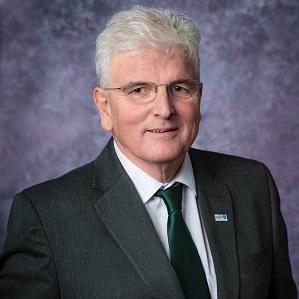
Des Browne
Vice Chair, NTI
Thank you, Charlotte, for that kind introduction and for inviting me to join you here today during the PrepCom for the 2015 NPT Review Conference. The Heinrich Böll Foundation is doing tremendously important work advancing global security, and particularly in areas destabilized by regional conflicts. I know we are all grateful for that commitment. The California-based Center for Nonproliferation Studies, which also sponsored this important event, is dedicated to training the next generation of nonproliferation specialists—work that I believe is central to the future of regional and global security efforts. Chen Kane deserves special mention, of course, for her work to develop The Middle East Next Generation of Arms Control Specialists network.
So it is my pleasure to be here today to engage with you on the very challenging topic at hand—nonproliferation in the Middle East—and to support and learn from the young people gathered here. You have committed your time, energy and brainpower to one of the world’s most vexing challenges, and through your network, you have already laid an impressive foundation for the hard work ahead.
With members from eight countries in the troubled region, you have collaborated on capacity building and regional dialogue projects, and your work should be a source of great pride for you. For me, to be here with young people working hard to make a difference under very difficult circumstances is a source of inspiration, and it gives me great optimism for the future of arms control. I am impressed that in the relatively short time since the network was established, you have undertaken some innovative work, including a simulated conference on a Weapons of Mass Destruction-Free Zone in the Middle East. That effort involved negotiating a final declaration and concluded with presentations to officials at key conferences and events from Brussels to Washington, D.C. You have shown your elders that even within the constraints of your respective countries’ real priorities, it was possible to reach consensus.
You are showing your region – and the world – what is possible, and I congratulate you.
I come to you today wearing a couple of hats, including as Chair of the European Leadership Network and as the newly appointed Vice Chairman of the Washington-based Nuclear Threat Initiative – both organizations working to advance the cause of mutual security in the Middle East, as well as the rest of the world.
At NTI, as our name suggests, much of our work is focused on nuclear issues, but we also address chemical, radiological and biological threats. I’d like to highlight one project related to biological risks that we’ve undertaken as an example of what is possible. In 2003, at a time when cooperative efforts on disease-related issues in the Middle East were scarce, we worked with health officials from Israel, the Palestinian Authority and Jordan to develop a regional network to promote effective response to future pandemic and bioweapons threats. Today, the Middle East Consortium on Infectious Disease Surveillance (MECIDS) serves as an emblem of cooperation in a region where cooperation too often seems impossible.
In addition, as part of its Nuclear Security Project, NTI has supported work geared toward capacity-building in the region through the Arab Institute for Security Studies in Amman, Jordan. The Institute has launched The Nuclear Forum, a community of Arab policymakers, researchers and scholars working to expand dialogue, strengthen the regional network of nuclear security experts, encourage research on nonproliferation and share lessons learned.
We have learned through this work that advancing mutual security in the Middle East is not a lost cause, though of course it also involves engaging with the significant challenges we’ve been addressing through the Non-Proliferation Treaty.
As you know all too well, the action plan agreed to at the last NPT Review Conference in 2010 included a commitment to hold a conference in 2012 on a WMD-free zone in the Middle East. The international community has thus far failed to deliver on that promise, and prospects for the 2015 Review Conference do not look good. In addition to the failure even to set a date for the promised WMD-Free Zone conference, other key global initiatives also remain stalled:
In addition, the challenges posed by North Korea and Iran will continue at least in the short and medium term, despite the welcome interim deal with Iran on its nuclear program. The crisis in Ukraine and increased tensions in Europe have given an injection of energy to those who argue that nuclear weapons are key to security and territorial integrity. We are traveling back to the future—or, as I prefer to say, forward to the past, and we will be in a new Cold War soon if we are not careful.
It is clear there is much work to be done, and my generation bears much of the responsibility for where we are – and where we are not – today.
So as the final PrepCom for 2015 comes to a close here in New York, let me lay out just a few of the actions we at the European Leadership Network believe need to be taken to ensure a successful Review Conference in 2015. And in doing so, I draw directly on a European Leadership Network group statement signed by over 50 political, military and diplomatic leaders from across Europe, including Russia, just last week. In that statement, copies of which are available here today and online, we call for:
These are some priorities, but there is more to be done. Iran will play a key role, of course, and other Middle East countries that aren’t signatories, such as Syria, must be brought into the dialogue.
In addition, global leaders must stay focused on nuclear materials security, the subject of several Nuclear Security Summits held over the past four years in Washington, Seoul and, most recently, The Hague. Locking down the materials that can be used to build a bomb should be among the highest priorities of governments, and officials must work to build an effective global system to track, protect and manage them.
Through your work over the past three years, I imagine you have learned a great deal about how challenging the road ahead will be – particularly in the Middle East. You also know by now that your generation will shoulder the burden and the responsibility for making progress on some of the most intractable problems the world has ever faced.
I know you are up to the challenge. I am impressed by your commitment, and I encourage you to stay involved, to engage in the conversation, and to continue to show leadership. You are positioned to be the leaders of tomorrow, and your work in the Middle East can be a beacon.
I look forward to the panel discussion. I plan to stay, take notes and report back on what I hear to my colleagues in Europe and in Washington. I stand ready to support your key objectives: to raise awareness of your organization, to help you extend your membership, and to raise political and financial support.
Thank you for your dedication to a difficult cause. My own work in this field would not have been possible without a steady optimism about the possibility for progress – and the dedication of young people to this work gives me more optimism still.
Sign up for our newsletter to get the latest on nuclear and biological threats.
The co-conveners and participants of the Euro-Atlantic Security Leadership Group call for the re-establishment of basic principles relating to security and nuclear order.
This paper highlights the need for renewed attention to the catastrophic effects of nuclear conflict as a crucial step toward reducing the risk of nuclear use.
There is a critical need for a global diplomatic approach to address growing cyber risks, including, where possible, through cooperation between the United States and Russia.


